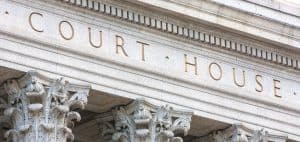The Forest Service summaries are here: Litigation Weekly October 23 2020 EMAIL
NEW CASES
Historic Wolf Creek Boatworks v. United States of America (D. Alaska). The plaintiff claims the Forest Service violated 36 C.F.R. 251.54 in relation to non-renewal of a conditional use permit for operation of buildings on the Tongass National forest.
NOTICE OF INTENT
The Center for Biological Diversity and Western Watersheds Project have notified the Forest Service, BLM and Fish and Wildlife Service that they will challenge the failure to reinitiate ESA consultation on the Gunnison sage-grouse (as previously discussed here).
OTHER CASES
Bullock v. U.S. Bureau of Land Management (D. Mont.). The district court declared that the Lewistown Resource Management Plan (RMP), Missoula RMP, and Miles City RMP amendment are unlawful because the Acting BLM Director approved them in violation of the Appointments Clause of the U.S. Constitution, the Federal Vacancies Reform Act of 1998, and the Administrative Procedure Act (which we discussed most recently here.)
BLOGGER’S BONUS
The replacement of Ruth Bader Ginsburg on the U. S. Supreme Court with a conservative justice has potentially stunning implications for many aspects of American life, including federal agencies. In particular, E&E News singled out her Congressional testimony (or lack thereof) on climate change
Sen. Richard Blumenthal (D-Conn.) asked Barrett yesterday if she believed “human beings cause global warming.” “I don’t think I am competent to opine on what causes global warming or not,” Barrett answered. When pressed on the question, she added, “I don’t think that my views on global warming or climate change are relevant to the job I would do as a judge.”
In an exchange with Sen. John Kennedy (R-La.) on Tuesday, Barrett dodged a climate question by saying she’s “not a scientist,” a talking point that is often used by Republican lawmakers who reject the underlying tenets of climate science (Climatewire, Oct. 14).
When grilled yesterday by Sen. Kamala Harris (D-Calif.), Barrett again declined to recognize that human-caused greenhouse gases have caused global temperatures to rise by about 2 degrees Fahrenheit over the last century… Barrett countered by saying Harris, a vice presidential candidate, was leading her to reveal an opinion about a “very contentious matter.” “I will not express a view on a matter of public policy especially one that is politically controversial because that’s inconsistent with the judicial role as I have explained,” Barrett said.
Barrett has been tight-lipped on a gamut of issues over the course of the hearing, from health care to voting rights. But experts said her reluctance to acknowledge the scientific basis for climate change is notable. “Her response suggests that she either is a climate change denier or someone who is afraid of offending the President and his supporters in the fossil fuel industry,” Bob Percival, director of the environmental law program at the University of Maryland, said in an email. On Tuesday, “she was willing at least to acknowledge that there is racism in society. Climate change has now also become an obvious fact that intelligent people should not be afraid to acknowledge,” he added.
Others countered:
“Given the various deference doctrines, whether an appellate judge has firm views on climate science is not particularly important and should not have a significant influence on their opinions,” said Jonathan Adler, director of the environmental law center at Case Western Reserve University.
This has been my answer to questions Sharon always has about the role of judges. However, this very concept of judicial deference to administrative agencies could itself be remade under a conservative court. Business conservatives have wanted to get rid of “Chevron deference” to agencies regarding their regulations. This is most often discussed in relation to the more obviously regulatory laws like the Clean Water Act and Clean Air Act, but it could also lead to less judicial respect for decisions made by agencies under the Endangered Species Act or public land management laws. In theory this seems like it should cut both ways because agencies get sued by both ends of the political spectrum, but here is another possibility:
But, by repealing Chevron, the Supreme Court would essentially invite judicial policymaking, as activist judges would have freer rein to exploit unavoidable statutory ambiguities in order to substitute their own policy preferences. Or worse, it could halt agency action until Congress could pass legislative changes to resolve all ambiguity.
The end of the “deep state?”


As to climate change, no one knows for sure about GHGs, vs other heating sources and natural variation. Many would like to think all that is known.. but it’s not.
The question wasn’t relevant. Similarly if I were interviewing for the head of the Global Change Science Center, I wouldn’t expect someone to ask me about the Hobby Lobby case.
No one knows anything “for sure,” but we know enough (as some judges have agreed). Also, I guess I don’t see the similarity at all – both climate and abortions are in her job description.
A couple of other potentially radical changes could come out of Barrett’s appointment. Conservative judges have tended to impose tougher standing requirements for individuals to sue the government. As this article summarizes: Trump’s appointments “are really about a philosophical approach to how much power agencies can have, how much access to the courts plaintiffs can have,”
https://e360.yale.edu/features/with-justice-barrett-a-tectonic-court-shift-on-the-environment
And this article discusses her possible views on the Commerce Clause of the Constitution that allows federal agencies to protect the environment at all.
https://www.jdsupra.com/legalnews/not-a-scientist-just-a-likely-supreme-93440/
Buckle up for the courts taking charge of the country.
Hmm. We know enough.. for what exactly? To take action? What kind of action? How fast do we need to take action? How important is it vis a vis other societal needs? We certainly don’t know the kinds of things judges ask us to put in EIS’s… such as the climate impacts of some project.
I hope judges rule on the basis of the merits of the case and the information presented to them, not on their own personal policy predilections. I think Amy agrees with me.
And I think you would get the same criticism as Amy for being a “denier” with this “no one knows” response to climate change.